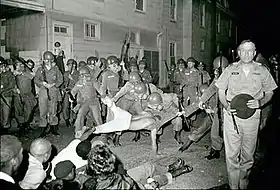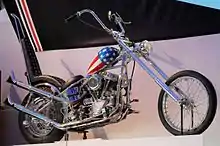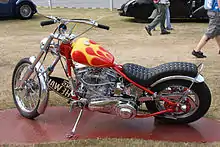Clifford Vaughs
Clifford A. "Sonny" Vaughs (April 16, 1937 – July 2, 2016) was an American civil rights activist, filmmaker, and motorcycle builder. Vaughs designed the two chopper motorcycles used for the 1969 film Easy Rider, while an associate producer on the film.[3] He also produced and directed the documentary What Will the Harvest Be? (1965) and Not So Easy (1972).[4]

Early life
Vaughs was born in Boston, Massachusetts, the only child of an unmarried mother. He was educated at the Boston Latin School, and earned his Bachelor of Arts degree at Boston University. He joined the Marine Corps in 1953, and afterward earned his master's degree at the University of Mexico, in Mexico City, majoring in Latin American Studies. He moved to Los Angeles in 1961, where he became involved in the custom motorcycle scene, and rode several Harley-Davidson 'Knucklehead' 'choppers'. In 1963, Vaughs was recruited to join the Student Nonviolent Coordinating Committee (SNCC) by Bob Zelner, while on a fundraising tour for the organization.[5] Vaughs drove his 1953 Chevrolet half-ton pickup truck to the East Coast to join the SNCC activities there. He was photographed by Danny Lyon being bodily dragged by five National Guard troops at a sit-in in Cambridge, Maryland, on May 2, 1964.[6] It was during this violent period of SNCC demonstrations that Vaughs first met Lyon. Activist Stokely Carmichael appears in the foreground of the photo, pulling Vaughs' right leg from Guardsmen.[1][2]
Vaughs carried his customized blue Knucklehead chopper in the bed of his pickup truck to Alabama in 1964, and rode the motorcycle to visit sharecroppers in remote areas. Vaughs said, "I may have been naïve thinking I could be an example to the black folks who were living in the South, but that's why I rode my chopper in Alabama. I'd visit people in their dirt-floor shacks, living like slavery had never ended. I wanted to be a visible example to them; a free black man on my motorcycle."[5]
In 1964, Vaughs filmed interviews with Martin Luther King Jr, Stokeley Carmichael, and Julian Bond, among others, on the rise of the Black Power movement in the US. The resulting documentary was 'What Will the Harvest Be?', which was aired in 1965 on ABC-TV. Vaughs was denied entry into the cameraman's union while working at KABC, and sued successfully to break the 'color barrier' for union membership.

The Credibility Gap grew out of a company formed by Lew Irwin and Vaughs.[7][8]
Motorcycles
In 1967, while working at KABC in Los Angeles, Vaughs interviewed Peter Fonda.[3] Vaughs and Fonda shared an interest in motorcycles, and Fonda introduced Vaughs to Dennis Hopper, which led Vaughs to join a new film project as Associate Producer, a "Western type movie with motorcycles".[5] Vaughs claims to have come up with the name for the film, 'Easy Rider', after the Mae West song, I Wonder Where My Easy Rider's Gone?

Vaughs purchased four Harley-Davidson 'Panhead' motorcycles at an LA County Sherriff's auction in 1967, and coordinated with motorcycle builder Ben Hardy, and mechanic Larry Marcus, to create the 'Captain America' and 'Billy' choppers for the film.[9] Two 'hero' choppers were built, and two stunt doubles for the ending scenes of the movie; while the stunt Captain America was destroyed in filming the final scene of the movie, the remaining three motorcycles were apparently stolen, and never recovered. First-time director Dennis Hopper consumed the limited budget for 'Easy Rider' very quickly, and Columbia pictures invested in the movie to finish it. At this juncture, Cliff Vaughs, and most other crew members, were fired, and a new crew hired. As part of a legal settlement for leaving as associate producer, Vaughs' contribution to the film, including the creation of the iconic motorcycles, was not included in the film's credits.[5]
In 1972, Vaughs worked again with Peter Fonda in a cameo role to film 'Not So Easy',[4][10] a motorcycle safety film. In 1976, Vaughs left the United States to live on a boat in the Gulf of Mexico.
In 2009, Vaughs was credited publicly for the first time as creator of the 'Easy Rider' choppers on the Jesse James Discovery Channel television series, the 'History of the Chopper'.
Vaughs was also a longstanding member of the L.A. chapter of the Chosen Few MC.
Vaughs died after losing consciousness and falling on July 2, 2016. He was 79.[11][12]
Notes
- Lyon, Danny (1964), Clifford Vaughs, SNCC photographer, Arrested by the National Guard, Cambridge, Maryland, Whitney Museum of American Art, archived from the original on October 5, 2016
- D'Orleans, Paul (2014), The Chopper: The Real Story, Prestel Publishers, pp. 164–170, ISBN 9783899555240
- Choppers Magazine #8, Roth (ed), 1967
- "Archived copy". Archived from the original on February 18, 2017. Retrieved March 18, 2016.CS1 maint: archived copy as title (link)
- The Chopper: the Real Story, d'Orleans, 2014. Gestalten, Berlin, ISBN 978-3-89955-524-0
- "- Danny Lyon (American, b. 1942) Clifford Vaughs,..." houkgallery. Archived from the original on October 5, 2016. Retrieved May 9, 2018.
- Page, Don (December 14, 1969). "Grist From the Radio's Rumor Mill". LA Times. Archived from the original on 2020.
- "~Los Angeles Radio People, Q&A 3rd quarter 1998". www.laradio.com.
- "The Vintagent". thevintagent.blogspot.com. Archived from the original on March 31, 2017. Retrieved May 9, 2018.
- https://www.youtube.com/watch?v=9xYc5ReUGvE
- Unsung Easy Rider Cliff Vaughs Passes Away Archived July 5, 2016, at the Wayback Machine
- "Death notices for Thursday, July 7, 2016". sanluisobispo.com. Archived from the original on October 7, 2016. Retrieved May 9, 2018.
References
- Lyon, Danny (1967), The Bikeriders, Macmillan, ISBN 0-8118-4161-8
- Dreisbach, Tom (October 11, 2014), "Behind The Motorcycles In 'Easy Rider,' A Long-Obscured Story", All Things Considered, NPR
- Fleming, Charles (July 8, 2016), "Appreciation 'Easy Rider' bike designer Cliff Vaughs, 79, lived many lives: Photographer, filmmaker, boat captain", Los Angeles Times
- Fleming, Charles (October 3, 2016), "Farewell to an Uneasy Rider: Memorial service for Cliff Vaughs", Los Angeles Times